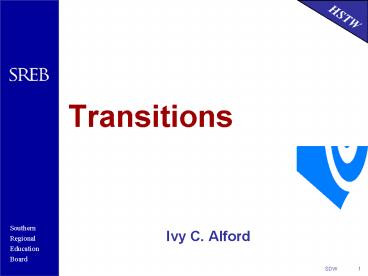Transitions - PowerPoint PPT Presentation
1 / 22
Title:
Transitions
Description:
Use seniors to mentor 8th graders. Consider doing a teacher swap. Host a special orientation day ... Organize into a series of learning communities: teams of ... – PowerPoint PPT presentation
Number of Views:17
Avg rating:3.0/5.0
Title: Transitions
1
Transitions
- Ivy C. Alford
2
Why target middle school transition?
HSTW
- The transition point from middle school to high
school has the highest percentages of dropouts
nation wide. - The highest failure rate occurs in grade nine.
- Preparing students for high school work, directly
impacts retention.
3
Before High School
4
Have teachers work together
- Improve communication between high school and
feeder schools faculties and administration.
5
Have teachers work together
- Have all 8th and 9th grade teachers who teach the
same subject area meet on a regular basis (at
least once a quarter) to discuss solutions to
impact deficiency areas that exist on both 8th
grade and 9th grade state assessments. - In addition, have all ninth-grade and middle
grades teachers reach agreement on essential
state and national readiness standards necessary
to prepare students for challenging high school
work--use the HSTW publications on Getting
Students Ready Guides. - Have the district curriculum coordinator work
with schools to develop a six through twelve
subject area map based on initial conversations
for high school readiness standards.
6
Get a jump start with students
- Establish meetings with 8th graders
- Host meetings for 8th graders and their parents
- Use seniors to mentor 8th graders
- Consider doing a teacher swap
- Host a special orientation day
7
Specialize classes for 9th graders
- Reduce the student-to-teacher ratio at grade nine
in all core academic subjects, particularly
mathematics, English/reading and science. - Select teachers with excellent content knowledge
and who have the 9th grade vision. - Consider creating a ninth-grade academy
8
Establish Extra Help Programs
HSTW
- Structured extra help programs in grades 7 and 8
- 4 to 6 week summer bridge program for students
who need accelerated instruction in math, English
and reading - Develop courses in grades seven and eight to give
extended time to read, write and do math
9
What makes a ninth-grade catch-up program
high-quality?
HSTW
- Early identification of students
- A lower student-teacher ratio in grade nine
- Qualified teachers with depth of content
knowledge teach challenging content - School schedules are modified to allow students
to be double-dosed English/reading and
mathematics
10
What makes a ninth-grade catch-up program
high-quality?
- Standard-based Curriculum with unit planning by
teachers - Teachers are organized into planning teams so
they can plan together - Recruit the best teachers to lead the ninth-grade
teams - Move beyond remedial instructional
- Comprehensive evaluation plan
11
Organize a Ninth-Grade School/Academy
HSTW
- Separate grade nine from the rest of the school.
- Get parent support.
- Organize into a series of learning communities
- teams of teachers
- common groups of students
- common planning time
12
The Power of I
- Establish a failure is not an option mission for
ninth graders - Require extra help
- Review transcripts with students
13
Habits of Success
- Ask teachers to integrate study skills, literacy
skills and other Habits of Success into their
lesson plans especially in grades 7, 8, 9 and 10.
- Design a ninth-grade enhancement course
14
Engage Students in CT Studies
- Determine how to get students into CT courses as
soon as possible - Create a ninth-grade CT exploration course
- Use interest inventories to assist students in
selecting a pathway or Cluster Area
15
Revise Resources
- Create and use scheduling resources that
highlight Career Clusters and/or pathways - Use these resources with required parent
conferences to assist students in planning their
high school studies - Create a portfolio system to use to chart
progress
16
Special Programs for At-Risk
- Create a priority emphasis for at-risk students
- Establish weekly or even daily contact points for
students - Communicate with teachers and administrators
- Provide incentives and periodic rewards for
students
17
Keep students in school
- Establish REQUIRED extra help programs
- Provide students/parents with progress reports
- Establish additional opportunities for students
to make up credits
18
Senior Struggles
- How do we provide focus to the senior year? How
can we assist students to take advantage of
senior year opportunities?
19
Why target postsecondary transition?
HSTW
- Senior year not taken seriously
- Low ACT and SAT scores
- High remedial rate in English and mathematics
- Students unprepared for workforce
- National completion rate for college only 39.9
20
Research Based Strategies for Postsecondary
Transition
HSTW
- Students earn college credit while in high
school. - Enroll unprepared students in transition
mathematics and English courses. - Courses aligned to college and career readiness
standards - Ensure that students who do not plan to go on to
further study are in a CT program. - Develop extra help for students having trouble
graduating.
21
Additional Actions for Making the Senior Year
Count
HSTW
- Have community college administer placement exam
during 11th grade - ACT Test for everyone in 11th grade
- Reality check prior to the senior year with
parents, adviser and counselor - Enroll seniors in upper-level courses
- Enroll all seniors in at least three academic
courses - Consider requiring a senior project that includes
a research paper, a product or service, an oral
presentation and a power point
22
- Contact
- Ivy C. Alford
- Director of State Services for School
ImprovementHSTW, SREB - ivy.alford_at_sreb.org































